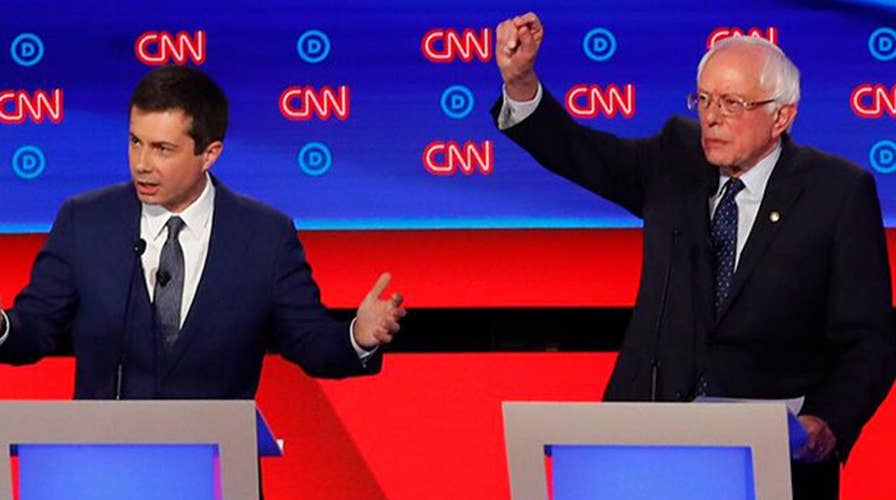Democratic presidential candidates Pete Buttigieg and Bernie Sanders weigh in on abortion debate
2020 candidate Pete Buttigieg draws on the Bible to defends abortion as Bernie Sanders links abortions to fighting climate change; reaction from Pastor Robert Jeffress, senior pastor at the First Baptist Church in Dallas and host of 'Pathway to Victory' on Fox Nation.
Democratic presidential hopefuls will have their first debate featuring just the 10 leaders Thursday. Previous sessions have stretched over two nights, which prevented the top candidates – former Vice President Joe Biden, and Sens. Bernie Sanders, I-Vt., and Elizabeth Warren, D-Mass. – from sharing the same stage.
While earlier televised debates provided some opportunities for others, especially Sens. Kamala Harris, D-Calif., and Cory Booker, D-N.J., none of the lower-tier candidates has been able to convert them into any serious momentum.
Thursday's one-night debate may lead to higher TV ratings, and it will also provide opportunities and risks for the contenders.
LONG-SHOT GOP PRIMARY CHALLENGERS TO HAVE THEIR OWN DEBATE THIS MONTH – MINUS TRUMP
The leaders have a chance to draw a contrast among themselves. For candidates “in the pack,” there is a chance for a strong showing that could get featured in the post-debate coverage, and transform struggling campaigns.
CLICK HERE TO SIGN UP FOR OUR OPINION NEWSLETTER
That’s essential for them, because a look at polls over the past six months suggests that only two things have changed in the race, and they have little to do with the debates.
More from Opinion
- Liz Peek: Ignorance and silliness on display as Democrats race down climate change rabbit hole
- Mary Anne Marsh: Thursday's debate could be Elizabeth Warren's moment to become the Democratic nominee
- Tucker Carlson: Beto believes America is fundamentally evil -- The good news is he'll never be president
First, Biden announced with a clear anti-Trump message and managed, like a hare, to gain roughly 10 points, according to RealClear Politics averages.
Second, Warren’s focus on explicit policy proposals, far from pigeon-holing her as the ivory-towered professor, has given her tortoise-like momentum and moved her into the top three out the 20 current candidates.
So far there’s not much more that describes how the race has unfolded to date, with Warren’s movement apparently at the expense of Sanders. About the only dissent from this comes from a set of recent CBS News polls.
The conventional wisdom this year is that the race has “nationalized” – and that the state results are likely to mirror the national polls. But CBS found Warren a clear third in Iowa (but currently leading in New Hampshire). If Sanders manages to finish ahead of Warren in Iowa, then he could get significant momentum leading for New Hampshire, which is eight days later.
But until those contests start, we only have polling data. And thus far the story hasn’t changed.
Biden’s view of the race continues to be that President Trump is weak and controversial, and the party should nominate a centrist who can keep the focus squarely on Trump.
Who better to do that than Barack Obama’s eight-year vice president?
Sanders and Warren take the opposite view. They say the Democrats should articulate a very different approach for America. Sanders thinks he’s the best at this, because he’s been doing it the longest. Warren thinks she’s the best candidate because she has proposed the most detailed programs.
The polls suggest the party actually divides along the lines of those two visions of the campaign.
Voters favoring Biden generally want the party to nominate someone who can “beat Trump,” while those supporting Warren and Sanders want a nominee who will fundamentally change how the economy works, moving the nation farther left.
According to a Fox News Poll in July, 6 in 10 Democratic primary voters made ousting Trump their top consideration in a picking a nominee, while 4 in 10 say they want the party to nominate someone who will make fundamental changes.
The advantage for Warren and Sanders right now is that they are the only candidates fighting for the other 40 percent of Democrats who make major economic change their top concern. Viewers of the debate Thursday will see for themselves if Warren or Sanders can make the case that they are the standard-bearer for the “fundamental change” voter.
As for the rest of the pack, the question will be whether any candidate can convince voters that he or she would be better than Biden in articulating a winning Democratic vision for the country.
CLICK HERE TO GET THE FOX NEWS APP
Will the story change Thursday night? Maybe, but so far the debates really haven’t changed a thing. We could keep seeing a static Democratic race until Feb. 3, the night of the Iowa caucus.
Appropriately enough. It’s right after Groundhog Day.









































